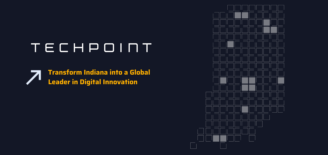TechPoint receives $750,000 from Microsoft Philanthropies to help career-changing adults access tech jobs in Indiana
For almost a decade, TechPoint has been connecting Indiana tech employers with tech- and business-skilled talent, particularly through its Xtern program, which serves up top college students for internships and jobs. Armed with a three-year, $750,000 grant from Microsoft Philanthropies, TechPoint will expand its impact by creating new tech career pathways for upskilling and career-changing adults.
“Indiana must meet our sector’s growing demand for new tech workers with greater participation from traditionally underrepresented groups, particularly from a gender and racial diversity perspective,” said TechPoint President and CEO Mike Langellier. “This funding will help us reach our goal of exponentially growing the Indiana tech workforce in an inclusive way by helping people get the skills they need to step into tech careers that can dramatically improve their lives, and the lives of their families.”
“Everyone needs access to technology, skills, and opportunity to pursue in-demand jobs in this increasingly digital economy,” said Naria Santa Lucia, GM, Digital Inclusion and U.S. Community Engagement, Microsoft Philanthropies. “We’re excited to collaborate with TechPoint to bring an adult apprenticeship platform to Indiana, creating pathways for adults who are pivoting to a tech-focused career.”
Adult apprenticeship provides an on-ramp to rewarding, higher-wage jobs for those without college degrees and also a framework to connect mid-career individuals with skills-focused training for a new career or professional advancement. For employers, the adult apprenticeship model provides a cost-effective pipeline of motivated, more diverse talent with pre-existing work experience. TechPoint plans to operate the model with tech employers and in communities around the state.
“We’re proud and grateful that Microsoft Philanthropies believes in our vision and bet on TechPoint and Indiana with this investment. We expect this to be an impactful partnership for years to come,” Langellier said.
Indiana’s tech sector continues to grow rapidly, and the estimated median wage is higher than the state average median wage. The sector’s direct contribution to the state economy is 4.8 percent of $15.6 billion, according to data compiled for TechPoint by Fourth Economy.
The opportunity to secure those positions has not been evenly distributed, though. Black workers comprise just seven percent of the Indiana tech workforce, while making up 10 percent of the overall state workforce; women comprise 28 percent of the tech workforce while making up 48 percent of the overall workforce; and LatinX workers represent only three percent of the tech workforce while making up six percent of the overall workforce, per the U.S. Department of Education report on “Advancing Diversity and Inclusivity in Higher Education.”
Langellier said success will require a multitude of aligned partners, especially employers, education/training providers, community outreach organizations, and government workforce agencies. “But that kind of collaboration is in Indiana’s DNA,” he said.
Part of TechPoint’s work will include increasing connectivity between educators and those who train employees, along with hiring employers regarding terminology, job competencies and the hiring process. For example, some job descriptions could be altered to take a skills-based approach to ensure job prospects understand which proven job skills are sufficient to replace traditional degree and/or certification requirements or preferences.
“For people seeking to be doctors, nurses, teachers, accountants, lawyers or plumbers, the pathways, certifications and skills required are clear, as are the education prerequisites and training specifications,” said Dennis Trinkle, TechPoint’s executive vice president for talent pathways and programs. “That’s not true for occupations in tech, despite many of them being the fastest growing and highest paying occupations in our economy. With this funding, and continued collaboration from key stakeholders, we can fix that.”
Also needed is increased public awareness of the availability of tech jobs, their requirements and pathways to reach them. TechPoint will play an expanded role in both of those areas, by stepping into the gap between employers and education/training providers to facilitate alignment while also working to promote opportunities through its various platforms. For example, it will build upon its JobsInTech101 product to educate the public about tech occupations and requirements for tech careers, with additional emphasis on raising awareness of these opportunities to underrepresented communities.
To fully understand and explain the tech sector’s job needs and to map out plans to meet them, TechPoint worked with EmployIndy, Ascend Indiana and Conexus Indiana and the Indiana Chamber of Commerce to select and convene an employer advisory council comprised of tech employers from regions across the state, different industries, varied sizes and different growth stages.
Armed with macro workforce growth data and on-the-ground employer insights, the council selected an initial set of in-demand occupations, defined competency expectations and mapped likely career pathways to them. The initial occupations included both tech and tech-enabled roles: associate/junior developer, software developer, business/data analyst, IT support technician, project manager and product owner. TechPoint will continue to work with employers, educators, and key partners to define in-demand occupations and career paths and align education/training providers and employers to them.
“Opening opportunities and growing the tech and tech-enabled workforce is too important to be left to random acts of progress,” Trinkle said. “TechPoint has heard clearly from employers, education and training partners and other key partners that it must play a coordinating and facilitating role to ensure programs and pathways are focused on the solutions that work best and aligned for impact. Rather than just a thousand small initiatives, Indiana needs coordinated programs and pathways that will set Indiana apart, lift up Hoosiers and fuel economic growth and innovation.”
Langellier said council members are united in their belief that education and training providers who align to these specifications will graduate students with higher placement rates and employer demand. Employers who align to this terminology and skills-first hiring practices will benefit from larger and more diverse hiring pipelines, he added.
Employers and education/training providers interested in contributing to this project or offering ideas to raise awareness are encouraged to contact Trinkle at dennis@techpoint.org or via this form.
“Growing the tech workforce and opening pathways for those who have not had access to careers in tech must be collaborative,” Trinkle said. “We intend to draw together community partners to create awareness and to provide wrap-around support services. If you are engaged in this important work, we need, and want, to hear from you.”
In addition to the Microsoft funding, TechPoint will use financial support provided through the CICP Foundation, which received one of five interrelated grants totaling $34.6 million from Lilly Endowment Inc. to continue its Xtern program, which focuses on preparing college students for Indiana tech jobs.




